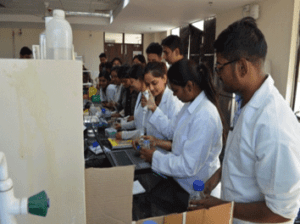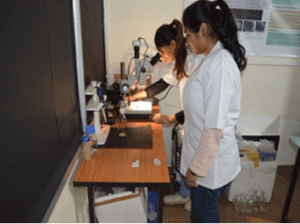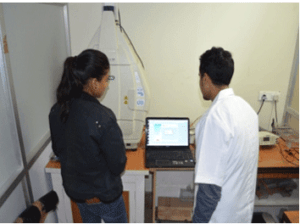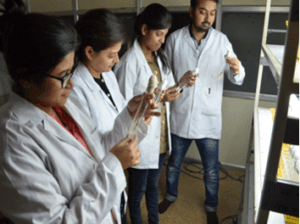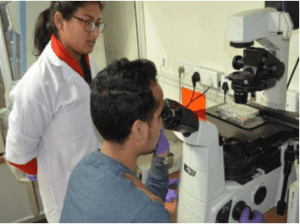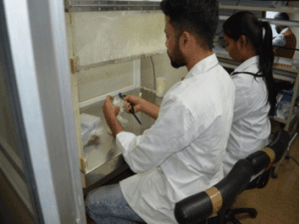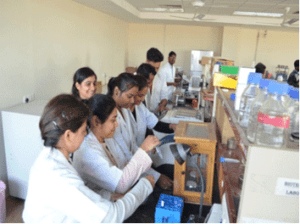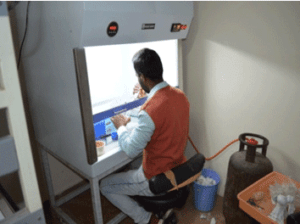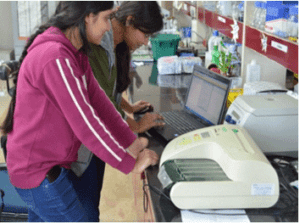


The Department of Biotechnology is is DST-FIST sponsored and currently offering Ph.D. and M.Sc. Biotechnology programs. These programs include well-designed theory and practical courses. Innovation-based training is the key to training students with a emphasis on understanding the basic and modern concepts in biological processes for pursuing research in frontier areas of Biological Sciences. The Postgraduate Programmes equip students with a deep theoretical and practical understanding of different aspects of biological processes and promote them to take on an integrative approach to their studies and research.
Biotechnology has emerged as one of the thrust area in science and technology and has the potential to boost the economy of India. The voice of global Biotechnology in the 21st century is to transfer bio-based technology from "Lab to Land and from Bench to Business" to bring the cost of bio-based commodities afforadable by the people. The courses in the Department of Biotechnology are mainly related to recent and emerging trends in Biology but also covers Biostatistics and Bioinformatics, and enable them to analyze their data, draw meaningful conclusions and publish in reputed journals. The Programme gives emphasis on integrated approaches to human health, biopolymers, recombinant DNA technology, transgenic development, infection and immunity, and bioinformatics. Students work directly with faculty on real-time projects, gaining hands-on skills which is necessary to solve emerging problems.
Currently, departmental research is focused in the areas of Antimicrobial Resistance, Biofilm, Behavioral Neuroscience, Cancer Biology, Fabrication of Bioplastics, Genetic Engineering, Genesis of Secondary Metabolites, Immunology, Molecular Marker Development, Molecular Diagnostics, Microbial Diversity, Stem Cell Therapy, Signal Transduction, and Transcription Factors. Apart from the above activities, M.Sc. Biotechnology Program prepares the students for leadership in research, policy writing, and business entrepreneurship.
The Department of Biotechnology has state-of-the-art technology and equipment that provide a stimulating environment for teaching and research. The Department of Biotechnology is actively involved in research by having the distinction of running more than 10 externally funded R&D projects sanctioned by various Government agencies.
Recently, Department of Biotechnology, Government of India, has recognized Department of Biotechnology of CUSB for financial support and admission of the students under DBT support through Centralized selection process GAT-B.
Department Overview
|
Established in |
2010 |
|
Employee Strength |
Faculty- 06 |
|
Student Strength |
Research Scholar & JRF-22 |
|
Placement 2021 |
x (tentative) |
|
Publications, Books & Patent |
Publications- |
News and Announcements
Important Links
-
Formats & Downloads
-
Archive
Board of Studies (BoS)
BoS is a statutory body for each department/centre, primarily responsible for syllabus design and regular update. As described in the Ordinance section 25.10,
The functions of the Board of Studies shall be:-- To recommend to the School Board, courses of studies offered by the Department/Centre and continue updating syllabus;
- To take all steps in accordance with the provisions of the Regulations about teaching and evaluation of various courses/programmes of the Department/Centre;
- To recommend to the School Board measures for the improvement of teaching and research in the Department/Centre;
- To constitute panels of experts to be considered for appointment as Examiners, Board of Examiners for various courses/academic programmes and M.Phil./Ph.D. thesis representing various specializations of Departments/Centres; and
- To perform such other functions as may be assigned to it by the School Board, the Academic Council, the Executive Council and the Vice-Chancellor.
Department Committee (DC)
As enshrined in the Ordinace-26, the Department/Centre Committee (DC/CC) shall consist of the Head of the Department/Centre, as Chairperson ex-officio, and all faculty members of the Department/Centre.
26.2 The Department/Centre Committee shall have the following functions, namely–- To make proposals to the Board of Studies on academic programmes concerning teaching and research, and the creation, specialization and abolition of teaching posts;
- To propose schemes for the maintenance and improvement of the standards of various programmes of study and research of the Department/Centre;
- To apportion the teaching and co-curricular work of the Department/Centre among the teachers thereof and monitor the proper execution thereof;
- To consider and decide on the assignment and utilisation of the space, equipment and other assets of the Department/Centre and other matters of general and academic interest of the Department/Centre;
- To consider and recommend perspectives and major thrust areas for research and to propose research projects to be taken up by the members of the Department/Centre, individually/collectively;
- To review and apprise the SRC/URC with the current status of research in Department/Centre;
- To suggest to SRC/URC norms related to qualifications and research experience of a faculty to be recognized as a research degree supervisor and to constitute Department/Centre Research Degree Committee (DRC/CRC);
- To suggest to University Admission, Teaching and Evaluation Committee (UATEC) on any issue related to admission, teaching, continuous evaluation in courses and students’ assessment of courses, offered by the Department/Centre to improve quality of education.
- To constitute such Committee(s) comprising members of the Department/Centre, and if necessary external experts, for framing and implementation of rules and regulations related to admission, teaching, continuous evaluation, maintenance of students’ records including alumni affairs as well as promotion of research and development; and
- To perform such other functions as may be assigned by the Ordinances or Regulations, or by the Vice- Chancellor/Dean/School Board from time to time.
Department Research Degree Committee (DRDC)
Departmental/Centre Research Degree Committee (DRDC/CRDC) deal with all matters connected with the Ph.D. Programme of the Department and report the matter to the University Research Degree Committee (URDC), as per University Ordinance-33. It consists of the Head of Department/Centre as Chairman and other faculties in the department.
Functions of DRDC/CRDC are as follows:- Allotment of Supervisor, Co-Supervisor, recording reasons for not admitting a candidate.
- Recommendation for extension of time for submission of thesis
- Recommendation to peruse a part of research outside the University
- Approval of the Course Work
- Assessment and Grading in Course Work
- Monitoring the research progress of the candidate
- Approval of Research plan proposal/language
- Sanction of duty leave to the Ph.D. candidate
- Assessment of Ph.D. work through pre-submission seminar
- Maintaining the record of research paper publications of the candidate
- 11 Recommendation of panel of experts for thesis evaluation
- Assessment of revised thesis for satisfactory compliance, if any
- Arrangement of Viva-voce in the absence of the supervisor
- Recommendation to waive the Viva-voce
Research Advisory Committee (RAC)
A Research Advisory Committee (RAC) is constituted for every research scholar admitted in PhD programme. The Committee would guide the research scholar to develop the study design and methodology of research and to To periodically review and assist in the progress of the research work of the research scholar. The committee shall have also have power to recommend the co-supervisor and cancellation of registration
Continual innovation in education, research, creativity, promotion of entrepreneurship, transferring the bio-based technology from “Lab to Land” and to make it cost effective, for the benefit of transformation in society.
Mission:Inculcating academic skills, professional skills, vocational skills, communication skills and life skills among the stakeholders.
- Objectives of the Program : The two year (four semesters) Post-Graduate Programme in Biotechnology has interdisciplinary approach with participation of faculty and researchers across the University based on NEP2020 pattern with an option of exit after one year leading to Post Graduate diploma in Biotechnology. Hands-on training with professional and management skills are keys to our teaching pedagogy. This programme focuses on to build the students a responsible educator/researcher and follow ethics in research and policy. We are equally giving emphasis on integrated approaches to human health, transgenic crop development, environmental sciences, skill development and bioinformatics. The course also comprised of project dissertation, presentation and comprehensive viva-voce as part of evaluation system. There is option of entry in the second year M.Sc program (3rd semester) provided the student fulfill the eligibility criteria completing the 4-year Bachelor degree in Research subject to availability of the seat in the department. Students are also visiting major research institutions in the form of educational/excursion tour and Biotechnology industries to provide them opportunity to learn various aspects of process and product developments. One of the major goals of the Biotechnology programme is to engage the students by actively involving them in cutting-edge research and development.
- Program Outcomes : The major goals of the Biotechnology Programme is to engage students by actively involving them in cutting-edge research.
- Eligibility : Bachelor's degree in Biotechnology or any branch of Biological Science (Microbiology/ Biochemistry/ Bioscience/ Environmental Science/ Biomedical etc.) or B.Sc. (Hons) in Zoology/Botany/Chemistry or B.Sc. / Integrated B.Sc. B.Ed. of three/four-year duration with any of the two subjects among Zoology, Botany & Chemistry in 3rd year with a minimum of 55% marks for General / OBC/EWS candidates and 50% marks for SC/ST / PWD candidates from any recognized University.
- Intake : 45
- Objectives of the Program :
- Thrust Areas of Research for Ph.D.Biotechnology
- Antimicrobial Resistance and Biofilm
- Behavioral Neuroscience
- Biopolymers and Bioplastics
- Cancer Biology
- Immunology
- Molecular Diagnostics & Microbial Diversity
- Plant Biotechnology & Molecular Marker Development
- Signal Transduction & Transcription Factors
- Stem Cell Biology
- Program Outcomes : Department of Biotechnology equips researchers with a deep theoretical and practical understanding of different aspects of Biological processes and to take an integrative approach for their studies and research. The students are well trained in dry and wet-lab techniques enabling them to better fit in different research laboratories and industries which look for personnel well-taught in programming languages, can do molecular modeling, and have abilities to work on bench-producing raw data to analyze further using various Biotechnology tools.
- Eligibility : Master’s Degree in Biotechnology/ Pharmaceuticals Science/ Medical Science/ Agricultural Science/ Chemistry/Physics/ any branch of Biological Science (Microbiology, Biochemistry, Molecular Biology, Human Genetics, Life Science, Bioscience, Environmental Science, Biomedical, Zoology, Botany) with a minimum of 55% marks for General /OBC candidates and 50% marks for SC/ST candidates in the qualifying degree.
The Department of Biotechnology is currently offering Ph.D. in the diverse field of specializations such as Antimicrobial Resistance, Biofilm, Behavioral Neuroscience, Cancer Biology, Fabrication of Bioplastics, Genetic Engineering, Genesis of Secondary Metabolites, Immunology, Molecular Marker Development, Molecular Diagnostics, Microbial Diversity, Stem Cell Therapy, Signal Transduction, and Transcription Factors.
The syllabus was framed with great care so that the theory, practicals, and tutorials would meet the requirement of such a challenging and demanding field. Innovation-based training is the key to training students with emphasis on understanding the basic and modern concepts in biological processes for pursuing research in frontier areas of Biological Sciences.


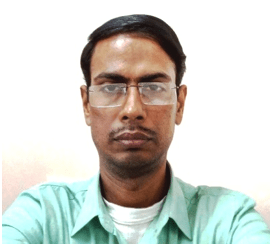
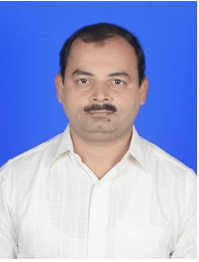
- Lab facility
- Research Lab :
- List of instruments in the Lab
- Lab staffs and their contact
Biotechnology Laboratory is equipped with state of the art technology and equipment that provide a stimulating environment for teaching and research. The list includes multiple Biosafety Cabinets, Laminar Air Flow, Autoclave, Water bath with wide temperature ranges, Dry Block Heater (Heating Block), Rotatory Shaker, Stackable Incubator Shaker, Cell Sonicator, Many types of Microscopes (Fluorescence, Inverted, Compound and Normal), various types of refrigerated Centrifuges, Nano Drop UV/VIS Spectrophotometer, ELISA Plate Reader, Spectrophotometer, Gradient Thermal Cycler, Real-Time PCR, UV/VIS Transilluminator, Gel Documentation Systems, Electrophoresis units (Horizontal and Vertical), Blot Transfer System, Deep Freezers (-200 C and -860 C), Ice-Flakes Machine, Cryo-Can, Lyophilizer, Complete Milli-Q Water System etc. Facilities for animal, plant and microbial culture work are also available.
| Sl. No. | Name of Instruments |
|---|---|
| 1 | Weighing Balance Fine and Coarse |
| 2 | Binocular Microscope |
| 3 | Biosafety Cabinet |
| 4 | Biosafety Cabinet (Rescholar) |
| 5 | BOD Incubator |
| 6 | Camera with accessories |
| 7 | Centrifuge 5418 |
| 8 | Centrifuge 5418, Eppendorf |
| 9 | Centrifuge 5418R, Eppendorf |
| 10 | Chemi Doc MP system, Gel Documentation |
| 11 | CO2 Incubator |
| 12 | Cryo Can 1.6L, 10.5L, 20.5L |
| 13 | Deep Freezer (-20⁰C) |
| 14 | Deep Freezer (-86⁰C) Freezer |
| 15 | Deep Freezer Voltas |
| 16 | Digital Magnetic Stirrer Hot Plate Tarson |
| 17 | Dual Adjustable Slab Gel Unit |
| 18 | Electronic Balance |
| 19 | Eppendorf PCR Machine |
| 20 | Freeze Dryer (Lyophilizer) |
| 21 | Gradient PCR Palm Cycler |
| 22 | Heating Block |
| 23 | Horizontal Electrophoresis Unit- Mini Sub Cell GT System |
| 24 | Hot Plate |
| 25 | Hybridization/Orbital Oven |
| 26 | Ice Flacking Machine |
| 27 | Imark Microplate Absorbance Reader with Microplate Manager software |
| 28 | Incubated Shaker |
| 29 | Induction Top |
| 30 | Inverted Research Microscope with other accessories |
| 31 | Laboratory Incubator |
| 32 | Laminar Air Flow |
| 33 | Magnetic Stirrer with Hot Plate |
| 34 | Microprocessor-based pH meter |
| 35 | Microscope Olympus |
| 36 | Microwave Oven |
| 37 | Mini Centrifuge |
| 38 | Mini Spin |
| 39 | NanoDrop UV/VIS Spectrophotometer |
| 40 | Nucleic Acid Electrophoresis Unit (10x12 – 11x12 cm) |
| 41 | Nucleic Acid Electrophoresis Unit (6.7 – 7.8cm) |
| 42 | Orbital Incubator Shaker, Orbitek LETTH |
| 43 | PH Meter |
| 44 | Plant Tissue Culture Rack |
| 45 | Proflex PCR System |
| 46 | Projector Multimedia with accessories with screen |
| 47 | Refrigerated High-Speed Table Top Centrifuge with Changeable rotor |
| 48 | Refrigerated Microcentrifuge, Tarson |
| 49 | Rocker/Rotary Shaker |
| 50 | Sonicator |
| 51 | Stereo Zoom Trinocular Microscope |
| 52 | Table Top Refrigerated Centrifuge |
| 53 | Thermal Cycler VERITY 96 Well |
| 54 | Tissue Culture Rack |
| 55 | Trans-Blot Turbo |
| 56 | Transilluminator |
| 57 | Trinocular Microscope |
| 58 | UV-Vs Spectrophotometer |
| 59 | Vertical Gel Electrophoresis Unit- Mini Sub Cell GT System |
| 60 | Vortex Mixture |
| 61 | Water Bath Shaker |
| 62 | Water Bath, Low-Temperature Circulating. |
| 63 | Water Purification System |
| 64 | X-Cell Sure Lock Mini Cell |
- Project
- Dr. Nitish Kumar PI, SERB (2020-; Lacs)
- Prof. Rizwanul. Haque PI SERB (2020-; Lacs)
- Dr. Durg Vijai Singh, PI, DBT (2020-; Lacs)
- .
- .
- .
- .
E-Resources for Courses
|
Course Code |
Course Name |
Question papers (Previous Years) |
Notes and Presentations |
Video and Suggested readings |
Course Assessment Design - MSc
- Semester –I
- Semester –II
- Semester –III
- Semester-IV




